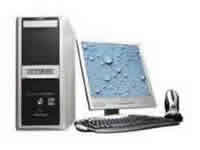Desktop is a traditional name for a PC associated with a desk position and also includes towers, mini tower and small form factor (SFF) computers.
- Where laptops and tablets are highly portable, a desktop generally comprises of a base unit (usually on or under the desk), a screen, a keyboard, a mouse. Additionally other devices (printers, speakers, projectors, addition screens, additional drives etc.) can easily be physically (or Wi-Fi) attached.
- Upgrades are generally easier as components are often transferable, but it should be remembered that motherboard evolution can often mean that a 'card' that fitted in your five year old PC may not be compatible with your new one.
- A big advantage of desktops over laptops can be the power/price ratio. A desktop will nearly always out perform a laptop of the same price.
- in general the following should be considered when purchasing a desktop:
- Physical size: will it fit on / under the desk?
- Storage size: how big / fast do the drives need to be?
- CPU speed: how fast does the processor need to be and how may do I need?
- RAM size: how much memory will I need for the PC to perform efficiently?
- Ports: what do I need/want to connect to the PC?
- The other advantage is that if you don't get the configuration right first time, it is more likely that you can upgrade a desktop later.
 General
Cloud
Servers
Desktops
Laptops
Tablets
Smartphones
Networks
IP Telephony
MS Windows
MS Office
Domain Names
General
Cloud
Servers
Desktops
Laptops
Tablets
Smartphones
Networks
IP Telephony
MS Windows
MS Office
Domain Names
William Dean Consultancy ltd.
Making IT Work since 1985

© 2016 William Dean Consultancy ltd.
01635 202267